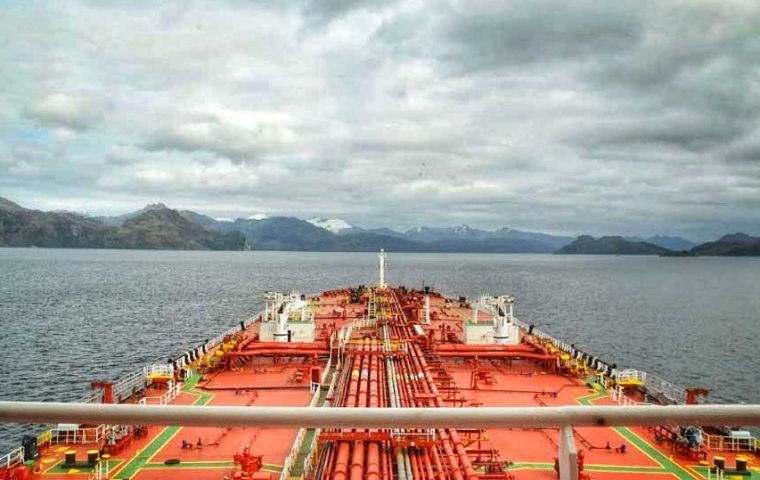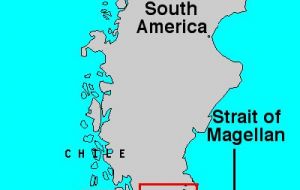MercoPress. South Atlantic News Agency
Panama Canal shipping queues: Punta Arenas dreams of a re-edition of pre 1914 scenario
 Ships sailing along the Magellan Strait, originally discovered in 1520 and linking the Pacific and Atlantic oceans
Ships sailing along the Magellan Strait, originally discovered in 1520 and linking the Pacific and Atlantic oceans Punta Arenas in the extreme south of Chile and the South American continent is again illusioned with the re edition of pre 1914 times, before the United States finished the Panama Canal and created the state of Panama, significantly cutting the time of shipping wishing to cross from the Pacific to the Caribbean and vice versa, and ensuring safe and reliable links between the East and West coasts of the US.
This is because the Canal of Panama is facing a most serious drought and lack of rain in the surrounding mountain ranges, clearly insufficient to fill the waterway system, limiting the number of vessels crossing plus considerably reducing the tonnage and draft of ships queuing up at both ends.
And when the Canal is not only a formidable and strategic tool for global shipping and trade, plus defending US interests, it also has immense repercussions for countries along the Pacific rim of South America such as Chile and Peru, who are also leading beneficiaries of such saving of time and costs. No wonder the idea of appealing to the Magellan Strait has emerged.
In effect for over 400 years the Magellan Strait in Southern Chile not only linked the Atlantic and Pacific oceans but also helped to develop Patagonia, has become the access to Antarctica and sponsored other industries such a shipping, fishing, mining and energy. But as the drought in the Panama Canal worsens according to forecasts, major vessels, mainly oil tankers and bulk carriers will be unable to make the short cut. It is estimated that by next February the timetable waiting list for crossings, with all tonnage and draft restrictions, will have doubled, meaning the normal traffic capacity of the fluvial waterway will be less than half.
But not are all negative news, for the international analyst Guillermo Holzmann, and member of a Chilean think tank Analytyka Consultants that advises several government institutions, “the Magellan strait is a safe path for transporting oil, gas or energy in a highly convoluted world”. Furthermore, some countries and agencies might prefer “to pay extra” to make use of a route with no nuclear submarines from different powers roaming in the area and where terrorism actions are clearly limited, and this “could be an excellent opportunity to promote the future of Punta Arenas.”
However a former commander of Chile's Third Naval Zone, Punta Arenas, retired Rear/Admiral Ronald Baasch was more cautious. “To think that the Panama Canal is going to collapse and this will mean shipping will have to be diverted to the Magellan Strait, is something hard to sustain currently. However if the delay factor with long queues of vessels waiting for weeks to cross, and other tonnage restrictions, it is very possible that users of the Canal assess the possibility of appealing to the extreme south of the continent”.
Former R/A Baasch estimates redirecting shipping from the Caribbean to the Magellan Strait can take over ten days. Much will depend on fuel costs, and the kind of cargo, but for some agencies the normal three day crossing at Panama is already close to ten days and even 16 days given the delays. Besides one of the drawbacks of the Magellan Strait are winds.
According to Chile's Maritime Territory and Merchant Navy Office, major vessels traffic along the Magellan Strait in 2022 reached 2,831, of which 1,117 Chilean and 1,714 foreign. But in the meantime the Panama Canal has had a transit of 13,000 vessels in the twelve months of last year.





Top Comments
Disclaimer & comment rulesCommenting for this story is now closed.
If you have a Facebook account, become a fan and comment on our Facebook Page!